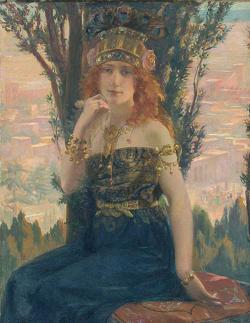 Helen of Troy
Helen of TroyPainting by Gaston Brussiere.
Poets have insistently used myth to help them address love, that grand ineffable. It?s handy?a character can be brought onstage and animated without the poet having to belabor the back story. Myths that rest on a few key elements seem especially useful. Cupid, the ?little love god,? is one example. Hallmark reminds us each February just what an arrow from his quiver equals. Another useful mythic character is Helen, the beautiful, half-mortal love-child of Zeus and Leda (or Nemesis) who was hatched from an egg.
Helen is lustful love incarnate. The myth variously represents her as either having been abducted by Paris of Troy or as having run off with Paris while her husband Menelaus was away. Regardless, she and her seductive beauty are held responsible for the subsequent 10-year war between Sparta and Troy?representing the enormous power that gets attached to sexualized female beauty. In Christopher Marlowe?s Doctor Faustus, Faustus begs Helen to transfer her immortality to him by way of a classic movie smooch, ?Sweet Helen, make me immortal with a kiss?; sexuality plus beauty (?the face that launch?d a thousand ships?) is a formula for fame and Helen is ancient evidence of it.
Helen?s beauty is often associated with ?whiteness? and light. For Faustus, she is ?Clad in the beauty of a thousand stars; Brighter art thou than flaming Jupiter.? In Oscar Wilde?s ?The New Helen? she is: ?Lily of love, pure and inviolate!/ Tower of ivory!? who ?come[s] down our darkness to illume.? In Poe?s ?To Helen? she stands: ?statue-like?: The agate lamp within thy hand,/ Ah! Psyche, from the regions which/ Are Holy Land!? And in Margaret Atwood?s more recent parodic ?Helen of Troy Does Countertop Dancing,? she rises: ?Like breath or a balloon ... in [a] blazing swan-egg of light.?
It?s not surprising to have erotic heat described as white-hot. And light/fire is power, which is why Prometheus got into trouble with the gods. H.D. (1886-1961), in her ?Helen,? reverses desire?s white heat and makes white the color of icy hatred. White appears three times in the first nine lines. The reiteration?especially when combined with ?lustre? (shine/gleam/glitter, but also glory/honor/fame) and ?cool feet??effectively turns Helen into a cold-footed/cold-blooded polished-marble statue. Rather than love, the clenched-jaw sparseness of the poem also gestures to hate. The rhyme scheme, irregular but adamant, avoids seeming too studied and yet creates a taut cohesiveness, as if an explosive charge is contained, but barely.
In the Iliad, Helen confronts Aphrodite, the goddess of love, and accuses her of sexual envy; Helen then disguises herself before going to Paris? room, lest the tongue-wagging women of Troy gossip about her. This moment essentially establishes the binary of lustful-hussy goddess (blissful libidinous boundlessness) and ?good-girl? Helen, who's conflicted about sex. Helen is a woman cursed with a form of beauty that is sexually alluring. In most of literature, Helen?s the mythic version of Jayne Mansfield, ?the girl [who] can?t help it,? but with serious consequences. In H.D.?s poem, Helen isn?t seen through the eyes of an appreciative lover, but of the envious mob. She?s the dangerous woman, one the haters would be willing to burn at the stake. Her powerful sexuality makes her universally despised, both by those who can?t have her and by those who can?t allow themselves to be her. The word ?white? returns in the last line of the poem to modify ?ash?; white-hot sexuality and white-hot hatred merge, leaving only scattered funereal ash. Now there?s nothing not to love. Some contemporary poets have grown suspicious of ancient myth?finding it fussy, even snooty?H.D.?s use of it conveys a keen psychological intelligence, unsurprising perhaps in a poet who will find her way to Freud nine years after publishing this poem.
Click the arrow on the audio player below to?hear Mary Jo Bang read H.D.'s poem "Helen." You can also?download the recording or?subscribe?to?Slate's Poetry Podcast on iTunes.
All Greece hates ?
the still eyes in the white face, ?
the lustre as of olives ?
where she stands, ?
and the white hands. ?
All Greece reviles?
the wan face when she smiles,?
hating it deeper still?
when it grows wan and white,?
remembering past enchantments?
and past ills. ?
Greece sees unmoved,
God?s daughter, born of love,?
the beauty of cool feet?
and slenderest knees,?
could love indeed the maid,?
only if she were laid,?
white ash amid funereal cypresses.
Source: http://feeds.slate.com/click.phdo?i=9dff4ebe6483ad96765295d8769ebeb7
corned beef hash the walking dead season 2 finale born free walking dead finale nascar bristol narwhal st louis university
No comments:
Post a Comment
Note: Only a member of this blog may post a comment.